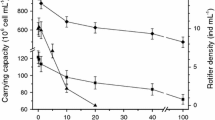Abstract
Experiments on 4 phylogenetically different phytoplankton exposed in culture to a range of concentrations of benzene, toluene and xylene showed a variety of growth responses for marine microalgae. The degree of influence of these aromatic hydrocarbons, all components of fuel oils and crude oils, varied with concentration, compound and species. Stimulation of growth in Dunaliella tertiolecta resulted from low μg/l concentrations of all three compounds, Skeletonema costatum showed no growth enhancement, while Cricosphaera carterae and Amphidinium carterae were intermediate in their reactions. Closed culture vessels were found to be necessary to retain these volatile hydrocarbons. Many of the previous laboratory studies on oil using standard methods — cotton plugs, screw caps or beakers — have overlooked the important influence of the volatile fraction. The species-specific stimulation of low concentrations was further shown in experiments with mixtures of No. 2 fuel oil. The volatile fraction was most biologically reactive, being the source of growth enhancement at low levels and a major growth inhibitor at high concentrations. Thus, a significant environmental effect of oil on marine primary production could be the growth stimulation of particular species by low molecular weight aromatic compounds resulting in an alteration of the natural phytoplankton community structure and its trophic relationships.
Similar content being viewed by others
Literature Cited
Bell, W. and R. Mitchell: Chemotactic and growth responses of marine bacteria to algal extracellular products. Biol. Bull. mar. biol. Lab., Woods Hole 143, 265–277 (1972)
Blumer, M.: Oil pollution in the ocean. In: Oil on the sea, pp 5–13. Ed. by D.P. Hoult. New York: Plenum Press 1969
Button, D.K.: Petroleum — biological effects on the marine environment. In: Impingement of man on the ocean, pp 421–429. Ed. by D. Hood. New York: Wiley-Interscience 1971
Currier, H.B.: Herbicidal properties of benzene and certain methyl deratives. Bilgardia 20, 383–406 (1951)
— and S.A. Peoples: Phytotoxicity of hydrocarbons. Hilgardia 23, 155–173 (1954)
Dallyn, S.L. and R.D. Sweet: Theories on the herbicidal action of petroleum hydrocarbons. Proc. A. Soc. hort. Sci. 57, 347–354 (1951)
Dunstan, W.M.: Problems of measuring and predicting the influence of effluents on marine phytoplankton. Envir. Sci. Technol. (1975). (In press)
Goldacre, R.J.: Effects of detergents and oils on the cell membrane. In: The biological effects of oil pollution on littoral communities, Vol. II. pp 131–137. Ed. by Field Study Council. London: Classey 1968
Gordon, D.C. and N.J. Prouse: The effects of three oils on marine phytoplankton photosynthesis. Mar. Biol. 22, 329–333 (1973)
Guillard, R.R.L. and J.H. Ryther: Studies on marine planktonic diatoms. Can. J. Microbiol. 8, 229–239 (1962)
Hutchinson, T.C., P. Kauss and M. Griffiths: The phytotoxicity of crude oil spills in freshwater. Wat. Pollut. Res. Can. 7, 52–58 (1972)
IDOE: Baseline studies of heavy metals, halogenated hydrocarbon, and petroleum hydrocarbon pollutants in the marine environment and research recommendations. Deliberations of the International Decade of Ocean Exploration (IDOE) Baseline Conference, La Jolla, California, May 1972
Korzep, D.A.: Toxicity of organic compounds. Unpublished Ph.D. Thesis, University of Texas, Austin 1962. (Quoted after Malina, 1964)
Malina, J.F.: Toxicity of petrochemicals in the aquatic environment. Wat. Sewage Wks 3, 456–459 (1964)
Menzel, D.W., J. Anderson and A. Randtke: Marine phytoplankton vary in their response to chlorinated hydrocarbons. Science, N. Y. 167, 1724–1726 (1970)
Minter, K.W.: Standing crop and community structure of plankton in refinery effluent holding ponds. Unpublished Ph.D. Thesis, Oklahoma State University 1965
Nelson-Smith, A.: The problem of oil pollution of the sea. Adv. mar. Biol. 8, 215–306 (1970)
—: Effects of oil on marine plants and animals. In: Water pollution by oil, pp 273–280. Ed. by P. Heppel. New York: Elsvier 1971
Strand, J.A., W.L. Templeton, J.A. Lichatowich and C.W. Apts: Development of toxicity test procedures for marine phytoplankton. In: Proceedings of joint conference on prevention and control of oil spills, pp 279–286. Washington, D.C.: American Petroleum Institute 1971
Zobell, C.E.: Microbial degradation of oil. In: Proceedings of joint conference on prevention and control of oil spills, pp 317–326, Washington, D.C.: American Petroleum Institute 1971
Author information
Authors and Affiliations
Additional information
Communicated by M.R. Tripp, Newark
Rights and permissions
About this article
Cite this article
Dunstan, W.M., Atkinson, L.P. & Natoli, J. Stimulation and inhibition of phytoplankton growth by low molecular weight hydrocarbons. Mar. Biol. 31, 305–310 (1975). https://doi.org/10.1007/BF00392087
Accepted:
Issue Date:
DOI: https://doi.org/10.1007/BF00392087




